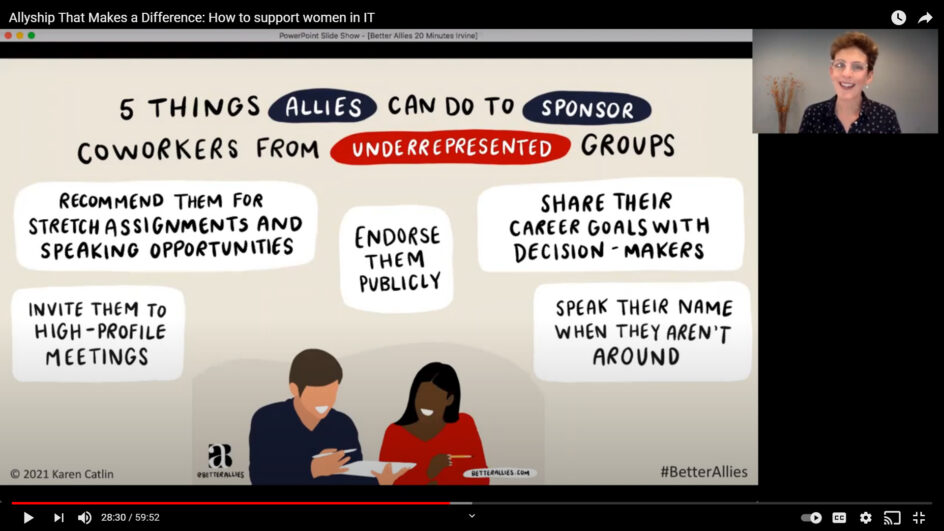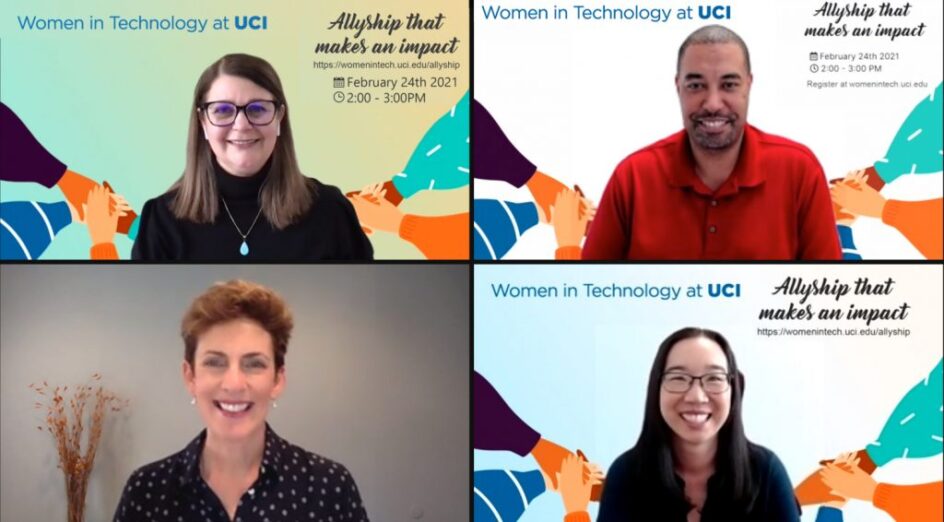Allyship Webinar Provides Practical Advice on Advocating for Inclusivity
How can we better support diversity, equity and inclusion in the workplace? Women in Technology at UCI (WIT@UCI) tackled this question with its first event of 2021, “Allyship That Makes an Impact: How to Support Women in IT.” During opening remarks for the Feb. 24 webinar, Shohreh Bozorgmehri stressed that “allies play a critical role in the success of underrepresented employees throughout their careers.” The founder of WIT@UCI and director of the Student and Academic Services Division of UCI’s Office of Information Technology (OIT) went on to ask, “everyday actions have the power to make a real difference, but what are these actions?”
On hand to provide the answer was Karen Catlin, author of Better Allies: Everyday Actions to Create Inclusive, Engaging Workplaces. Catlin, who worked for more than 25 years in the tech industry, turned her focus to advocacy after noticing a steady decline in gender diversity. “In tech companies, the closer you got to the C suite, the ‘maler and paler’ it got,” she noted. “These organizations clearly were not the meritocracy that most people thought they were.” So she started a Twitter account, @betterallies, to share everyday actions people could take to help create more inclusive environments — actions such as speaking up when interruptions occur, providing an equitable amount of performance feedback to all employees and diversifying your professional network.

After discussing a variety of actions people can take to support inclusivity, Catlin led a fireside chat with Jennifer Wong-Ma, associate professor of teaching in the Donald Bren School of Information and Computer Sciences (ICS), and Jason Valdry, assistant dean in the Claire Trevor School of the Arts.
Wong-Ma agreed that she had sometimes struggled throughout her career to get a word in edgewise. “I’ve experienced being talked over, interrupted and even having my own ideas, which I just presented, be repeated again and then be accepted the second time they are heard.” She asked Catlin how to disrupt these occurrences, especially in today’s virtual environments, to make meetings more inclusive. Catlin stressed the need to pay attention and speak up, saying something like, “I’d like to hear from Jennifer.” Or, if you see someone dominating the conversation, she suggested sending that person a private message. “I noticed we’ve both been talking a lot, so maybe we should spend the second half of the meeting listening more.”
This suggestion resonated in particular with webinar attendee Andre van der Hoek, chair of the Department of Informatics. He appreciated this reminder of “the value of private feedback — to those who unwittingly might be creating an environment that is less welcoming than it should be,” he said. “Often, an ally’s work can be done behind the scenes.”
Valdry, picking up on a note in the webinar chat, talked about the need to be proactive in your learning, and he shared his own journey as a Black male in technology “trying to learn more myself about where I have privileges.” Yet in striving to learn more in order to help others, he asked Catlin to discuss a topic she covers in her book focused on knights versus allies. “In our workplaces today, there’s opportunity to [look] out for one person… making sure they aren’t the equivalent of the ‘damsel in distress’ at the workplace,” explained Catlin. “But better is to look for systemic change that can benefit not just that one person but everyone.”
This was another discussion that van der Hoek appreciated. “Knights riding in with much fanfare to solve a given problem [versus] allies working to make structural changes — we need the latter!”

These were just a few of the topics covered during the webinar. To learn more, the recording of the event is posted online. You can also visit betterallies.com for resources or sign up for the 5 Ally Actions weekly newsletter.
“It is our hope that you have discovered practical ways to make a meaningful change for women and underrepresented colleagues in our workplace,” said Bozorgmehri at the end of the webinar. She closed out the event with a quote from Catlin’s book: “Being an ally is a journey, and you don’t have to do it all at once. Start with a single act. While it may seem small, you’ll make a difference. You may even start a ripple effect.”
— Shani Murray